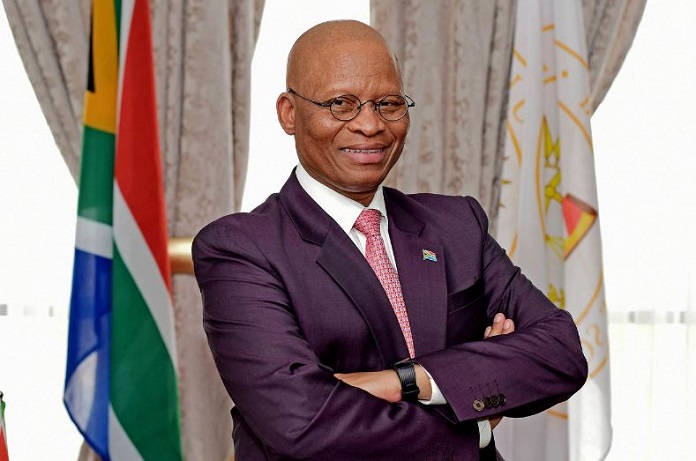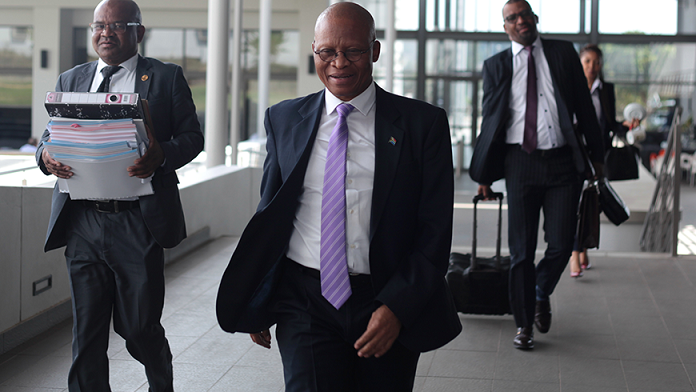A very influential and popular figure in his country, Mogoeng Mogoeng is a South African judge who has risen to the pinnacle of the legal profession. The 63 year old is the 21st Chief Justice of South Africa, meaning that he is the most senior judge of the Constitutional Court and head of the judiciary of South Africa. Mogoeng is saddled with the responsibility of exercising the final authority over the functioning and management of all the courts in South Africa.
As Chief Justice of South Africa, he is an inspiring figure today, and this is especially because of the way he managed to make a name for himself by rising through the ranks from a poor background to become one of the high-ranking figures in the country. Many South Africans also love him for some of the decisions he has made since he was appointed Chief Justice of the country.
Profile Summary of Mogoeng Mogoeng
- Full Name: Mogoeng Thomas Reetsang Mogoeng
- Date of Birth: 14 January 1961
- Age: 63 years old
- Place of Birth: Goo-Mokgatha (Koffiekraal), North West Province
- Nationality: South African
- Marital Status: Married to Mmaphefo Mogoeng
- Children: 3
- Occupation: Legal Practitioner, Chief Justice of South Africa
- Education: The University of Zululand, University of Natal, University of South Africa
Mogoeng Mogoeng Was Born 63 Years Ago To A Miner
Mogoeng Mogoeng, whose full name is actually Mogoeng Thomas Reetsang Mogoeng, was born on 14 January 1961 in Goo-Mokgatha (Koffiekraal), a village near Zeerust, a commercial town located in the North West Province. He was born to a father called Setshwaelo Herbert Mogoeng and a mother identified as Gaboipone Mogoeng. He was the oldest of his parent’s three sons.
Mogoeng’s father worked as a miner and his mother was a domestic worker. Growing up, he spent his early years in the Goo-Mokgatha neighborhood with his parents and siblings. It was also there that he attended primary school.
The Legal Practitioner Is A Very Learned Man
Mogoeng is a very learned man who has bagged different qualifications over the years. This is not surprising considering his exalted position as South Africa’s Chief Justice. He attended Mokgatlha Primary School as a child in the village of Goo-Mokgatha (Koffiekraal).
At the time, Mogoeng, a young boy growing up under apartheid, had to endure and suffer the pains of the repressive regime. He once explained that the suffering and torment he witnessed right from when he was a child pushed him to make the decision to make something meaningful out of his life. Also, his father’s constant advice to him about the importance of education, helped him make up his mind about attaining the highest level of education he could attain. The racial oppression he experienced also propelled him into activism.
The Experience That Scarred Mogoeng As A Child
One of the experiences that stayed with Mogoeng as a child, and got him even more charged about achieving success later in life, was the humiliation that his beloved grandfather, who was his mentor, was subjected to right in his presence. According to Mogoeng, he was at the farm with his grandfather when the members of the South African police stormed the place and asked for his grandfather’s identification card. The man told the police that he left it at home and pleaded for them to go home with him so he could show them the card. However, they paid no attention to what he was saying but promptly whisked him away to the station where he spent days before being released.
Mogoeng was left alone on the farm after his grandfather was whisked away and he had to find his way home to report what had happened. The experience left a scar in him and he made up his mind he was going to do the best he could to make it in life and try to turn things around for himself and his people.
He Was Politically Active In High School
Because of the oppression he and his family had been subjected to from early on, Mogoeng became charged to join student activism. When he graduated from primary school and began high school, he became politically active and turned into a student activist during the apartheid years. This was especially because he began to interact with other students and became more exposed to the reality of the South African political landscape.
Mogoeng became so active as an activist that while he was in high school, he organized the student body to observe a memorial to the victims of the Soweto uprising of 1976. He organized this memorial in 1980 when he was about 19 years. What he did angered the school’s management and he was dismissed from high school along with the other students who had observed the memorial with him. However, following their dismissal, other students became very angry and protested by organizing class boycotts. This eventually forced the school to re-admit Mogoeng and the others.
Mogoeng Mogoeng Has Qualifications From Three Universities
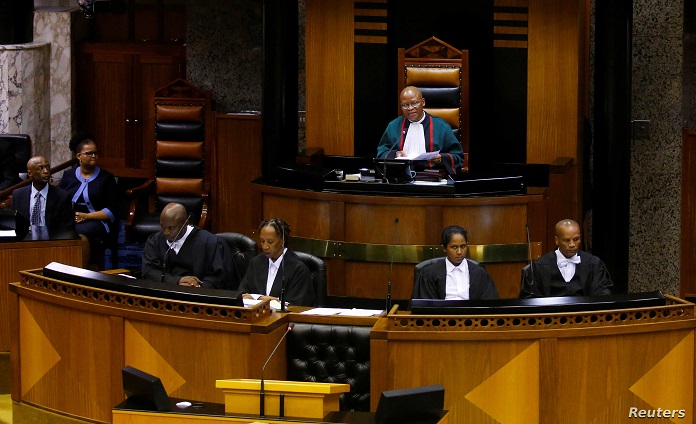
When he eventually finished high school, Mogoeng gained admission into the University of Zululand from where he graduated with a B.Juris in 1983 when he was about 22 years old. By this time, he was getting more exposed to the political reality in South Africa and was also meeting new people who were talking about politics and the fate of the anti-apartheid hero, Nelson Mandela, who was in prison at the time.
After he bagged his B.Juris degree in 1983 from the University of Zululand, Mogoeng proceeded to gain admission into another university, this time the University of Natal (now known as the University of KwaZulu-Natal) to do his Bachelor of Laws degree. It was while he was at the University of Natal that Mogoeng really became politically active. He became an activist within the Black Consciousness Movement even though he worked with structures linked to the African National Congress. He got very active in the Azanian Students’ Movement, which was a liberation movement at the time, and even rose to become a regional leader of the organization. This was during a period of great repression of black people by the South African armed forces.
Eventually, Mogoeng bagged a Bachelor of Laws degree from the University of Natal in 1985 when he was about 24 years old. Following this feat, he got enrolled in a third university, the University of South Africa where he obtained a Master of Laws degree by correspondence in 1989 at the age of 28 years.
- University of Zululand – B.Juris in 1983
- The University of Natal (now known as the University of KwaZulu-Natal) – Bachelor of Laws in 1985
- University of South Africa – Master of Laws in 1989
Why He Chose The Legal Profession
After graduating from high school, Mogoeng had several options of what to study in university. However, he settled for law. His decision was mainly influenced by the oppression he had seen his people endure while growing up during the apartheid reign in South Africa. He decided that if he became a lawyer, he could help his people more by granting them succor in court through legal representation. He saw himself representing those who did not have the financial resources to access legal representation, especially because at that time, legal representation had already begun to be expensive. He believed that the area in which he could possibly be more effective in helping his people was through legal practice.
According to him, he really wanted to reshape the future of South Africa and bring about a lot of difference in the country, and this, in his view, was more possible if he was a lawyer. Also, the fact that his heroes, including Nelson Mandela and Oliver Tambo, were lawyers inspired him to study law.
How Mogoeng Mogoeng Rose To Become Chief Justice of South Africa
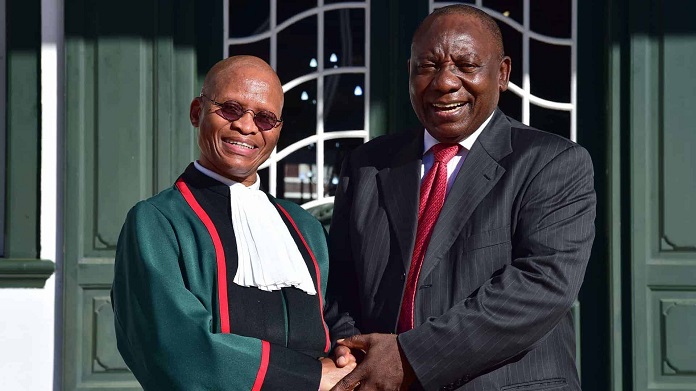
Mogoeng Mogoeng began his legal practice at the age of 24 in 1985, shortly after bagging his Bachelor of Laws degree from the University of Natal. He began by working for the government of Bophuthatswana as a High Court prosecutor in the city of Mahikeng. He worked there for about five years in order to raise money to repay his government bursary. He eventually left the place in 1989 after bagging his Master of Laws degree.
After leaving Mahikeng, Mogoeng began to practice as an advocate. After he had worked briefly at the Johannesburg Bar, he returned to Mahikeng and remained there for another six years practicing law. While in Mahikeng, he rose to become the chair of Lawyers for Human Rights’ Bophuthatswana chapter. He also worked as a part-time lecturer at the University of Bophuthatswana which is now known as North-West University.
His Judicial Career Began At Age 36
Mogoeng’s judicial career was officially kick-started in 1997 after he was appointed to the North West High Court as a judge. He was about 36 years old. At the time he felt he was too inexperienced to be made a judge but he later accepted the appointment. Nearly three years later in 2000, he became a judge of the Labour Appeal Court. As judge of the Labour Appeal Court, he earned about R1.8 million as his annual salary.
In 2002, Mogoeng became the Judge President of the North West High Court. In this capacity, he was raking in about R2.1 million as his salary every year. It is noteworthy that, in 2002, when he became the Judge President of the North West High Court, he was about 41 years old and he continued to serve in this capacity until 2009 when he was about 48 years old. It was clear that Mogoeng was enjoying a great and swift ride in his career.
To his great delight, in October 2009, Mogoeng was elevated to the Constitutional Court – the highest court in South Africa during President Jacob Zuma’s first raft of judicial appointments. Of course, his salary increased with his elevation; s a judge of the Constitutional Court rakes in about R2.3 million as an annual salary.
His Nomination For Appointment As Chief Justice Sparked Outrage
In mid-2011, shortly after he became a judge of the Constitutional Court, Mogoeng was nominated for appointment as Chief Justice of South Africa. However, his appointment sparked serious outrage and was heavily criticized by many people from different sectors, including the press, bar councils, local and international civic organizations, as well as legal academics. The nomination was even criticized by people within President Zuma’s own Tripartite Alliance.
Mogoeng’s nomination was heavily criticized because he was one of the Constitutional Court’s most junior members as he had been appointed to the court less than two years earlier in 2009. Everybody expected that Dikgang Moseneke, a judge who was Mogoeng’s senior and who had served the Constitutional Court for nine years, would be nominated. So, when Mogoeng was nominated ahead of Moseneke, it sparked serious outrage especially because Moseneke had been overlooked before.
Mogoeng’s nomination was also heavily criticized because there were widespread concerns about his judgments in rape and gender-violence cases. Many people felt he was too lenient on rapists and domestic assailants and was thus, promoting a spread of the dastardly act. In fact, the Nobel Women’s Initiative lent its voice into the matter and accused him of invoking dangerous myths about sexual assault, rape, and victim-blaming.
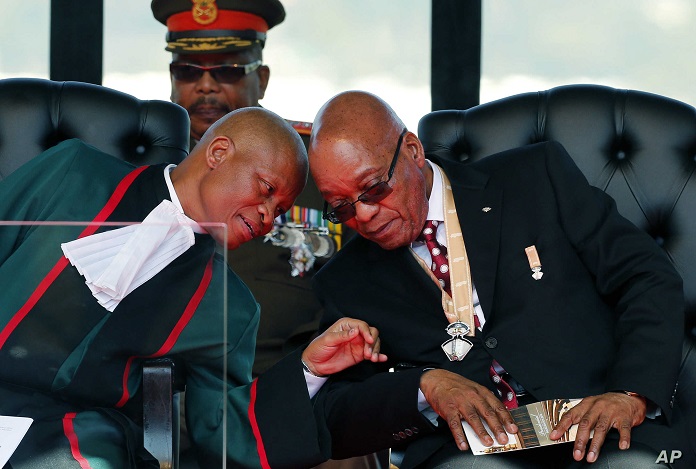
His Interview At The Judicial Service Commission
Before Mogoeng could be confirmed as Chief Justice of South Africa, he had to be interviewed by the Judicial Service Commission (JSC). Ironically, it was Moseneke, who was serving as South Africa’s Acting Chief Justice pending a permanent appointment, that chaired the JSC when it interviewed Mogoeng to determine his suitability to become Chief Justice. Eventually, after a grueling session of interviews at the JSC, Mogoeng was recommended by the JSC and was finally confirmed by President Zuma as Chief Justice of South Africa on 8 September 2011.
After his appointment as the Chief Justice of South Africa, the criticisms against him did not stop coming as the general public believed that the decision to appoint him as Chief Justice even with all the criticisms against him suggested very strongly that the JSC had been captured by political interests.
Mogoeng’s Salary and Exploits As Chief Justice
As Chief Justice of South Africa, Mogoeng’s salary is R2.9 million. This is not inclusive of other benefits that come with the exalted position. It is also noteworthy that since his appointment as Chief Justice, Mogoeng has successfully expelled the widespread suspicions that he would be an executive-minded Chief Justice. He has been hailed for regularly championing judicial independence as well as showing strong disapproval for interference in the judiciary by the executive.
In 2015, he was widely praised for his courageous and principled leadership after he organized an unprecedented meeting of all senior judges who released an exceptional press statement to attack the ANC government for allowing former President of Sudan, Omar al-Bashir, to leave South Africa in contravention of a court order.
Mogoeng has since continued to build strong confidence in his judicial leadership among the generality of South Africans and his many exploits, including his strong abhorrence for sexual violence and firm stand against executive interference in judicial rulings, have completely transformed the man from a supposed stooge of the government into a national hero.
For the record, Mogoeng is also a cleric who is now a Pastor in the Redeemed Christian Church of God. The man is a strong Christian and it had been noticed that his religious convictions have found their way into his judgments over the years.
